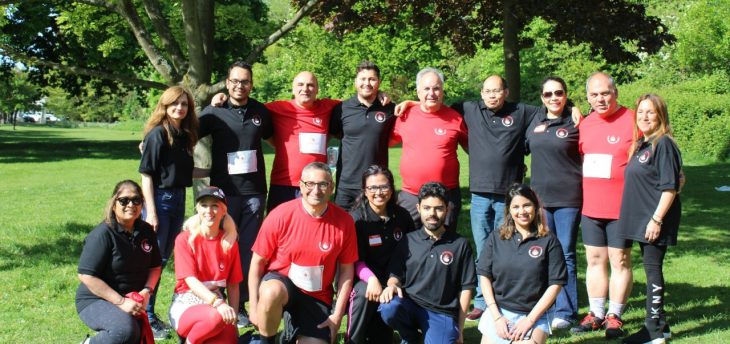
UKTS’ celebrates International Thalassaemia Day 2022
On Sunday 8th May 2022, Grovelands Park in North London turned red by a sea of supporters who came to celebrate the charity’s work and raise awareness of the genetic blood condition Thalassaemia.
The 5km fun-run was initially planned to be a small local event to celebrate International Thalassaemia Day and it quickly exceeded expectations as interest grew. The event was also extended to the global population following requests from loved ones and colleagues aboard all wanting to support the charity’s work.
The day was enjoyed by over 300 supporters in the sunshine with over 100 signed up to run or walk.
Globally, it was supported by over 30 countries with participants opting to wear red, complete the distance and provide pictures of themselves which they proudly shared on social media platforms with the hopes of raising awareness and much needed funds.
Patrons Peter Polycarpou and Kypros Kyprianou together with Bambos Charalambous, MP for Enfield Southgate and Chair of the All-Party Parliamentary Group for Thalassaemia not only supported the event but also participated by running the 5Km themselves!
They were joined at the starting line by Michael Yiakoumi (Parikiaki), Katerina Neocleous (London Greek Radio) Gabriel Theophanous (UKTS Chair), team members and supporters of the society.
The passion, commitment, and support of all the volunteers, supporters and the team were nothing short of amazing. UKTS received over £12,000.00 in donations, sponsorship and funds raised by patrons, volunteers, staff and supporters.
Due to the event’s success, many have requested that the UKTS make it an annual 5K!
Thalassaemia is a genetic blood disorder that affects the production of haemoglobin in red blood cells.
If you’re a carrier of Thalassaemia, it means that you carry one of the faulty genes that cause Thalassaemia, but you do not have the condition yourself.
Being a carrier is sometimes known as having the ‘Thalassaemia trait’ or having ‘Thalassaemia minor’.If you carry Thalassaemia, you will never develop the condition, but you may sometimes experience mild anaemia. This is because your red blood cells are smaller than usual. However, if you and your partner are both carriers, there is a 25% chance in each pregnancy that the baby can inherit a severe form of Thalassaemia necessitating life-long blood transfusions and a daily rigorous treatment plan.
The NHS Sickle Cell and Thalassaemia screening programme tests all pregnant women in England for Thalassaemia; however, you can choose to get tested at any time.
Finding out your carrier status is simple and all it takes is a blood sample.
Anyone can be a carrier of Thalassaemia, but it’s much more common in people from certain ethnic backgrounds.
Thalassaemia mainly affects people who are from, or who have family members originally from the Mediterranean, the Middle East, Asia, South-east Asia, the Caribbean and South America.
UKTS recommends knowing you and your partner’s Thalassaemia carrier status.